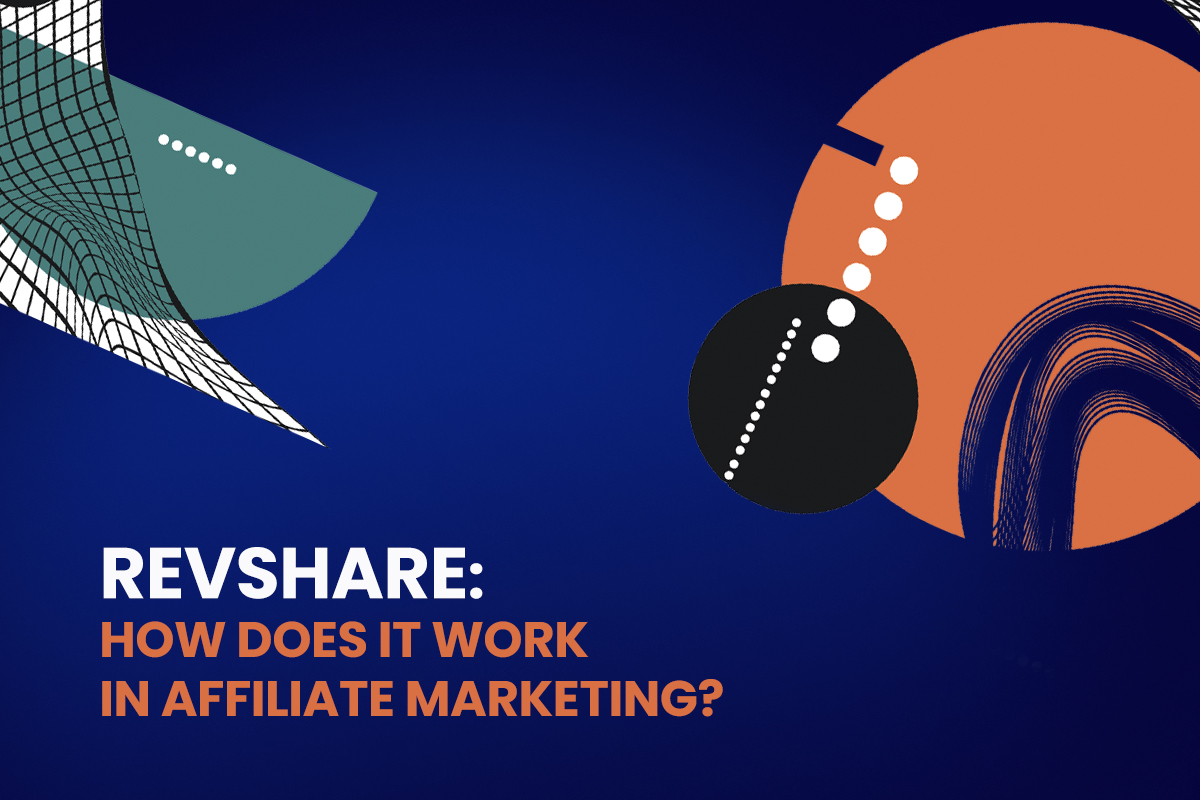Affiliate marketing operates on a simple principle: you direct traffic to a merchant’s website and earn commissions for specific actions completed there. The RevShare model (revenue sharing) represents one of the most powerful earning structures in this industry, offering potentially unlimited income through ongoing commission payments based on customer lifetime value rather than one-time actions.
In this guide, I’ll break down everything you need to know about revshare affiliate marketing – from how it compares to CPA models to real-world applications that can transform your affiliate business strategy.
Affiliate marketing follows a basic blueprint: you (as the affiliate) direct traffic to the merchant’s website and earn a commission for each action carried out there. Simple, isn’t it? This is exactly how CPA or cost-per-action model works. It involves fixed, one-time payouts for such actions as signups, subscriptions, downloads, etc.
Table Of Contents
RevShare vs CPA: Understanding the Key Differences
The RevShare model, or revenue share model, is based on a percentage of a merchant’s revenue – whatever that may be. What sets revshare marketing apart from CPA is its recurring nature. Simply put, you receive payments multiple times throughout the agreement. Plus, any upsells made by your referred customer are also calculated into your commission.
The revshare vs cpa debate can be tough to navigate. So, which model is right for you? Use this handy chart to figure out which suits you best.
| RevShare | CPA | |
| How you get paid | You’ll earn a percentage of the total revenue generated from the customers you send to the affiliate. | It’s a one and done deal. You’ll receive a set amount per specific action the customer takes. For example, if they purchase the product, you’ll get paid. But you won’t get paid if they purchase something else. |
| Risk level for individual affiliates | There’s a higher risk level here because you’re relying on a customer’s value of their lifetime. | There’s a lower risk level here because you can count on a specific amount of money per conversion. And it doesn’t matter what the customer does after that conversion. |
| How much money you can make | The sky’s the limit! The more a customer spends over their lifetime, the more you’ll earn. There’s potential for the money to keep on rolling in. | Again, it’s a one-shot deal here. You’ll only get paid once when the action has been completed. You won’t get paid for anything that follows. |
| Long-term potential | There’s a potential to earn long-term revenue, especially if there’s a recurring subscription involved. | There’s no potential for long-term revenue. Once you get paid for the customer’s action, that customer is no longer tied to you. They could spend a million dollars and you wouldn’t see one red cent. |
| Best for… | If the product you’re promoting has the potential for repeat purchases, like a subscription model, consider RevShare. | If the end goal is to get customers into the arms of the company, like for a trial or to sign up, CPA is best. |
| Trackability | You’ll be able to track your revenue, but the company you’re promoting will need to have a detailed and transparent system in place where you can easily track all revenue earned. | Because your revenue is tied to a single action, it’s much easier to track, and any data provided will likely be easier to understand. |
| Earnings predictability | If you’re counting on revenue, it’ll be harder to predict your earnings. Remember, it’s mostly dependent on what the customer does after acquisition. | You can use historical conversion rates to figure out what your earnings might look like. While not guaranteed, it’s easier to predict. |
Simple cases: how does revshare work?
Now that you better understand revshare meaning, let’s put it into practice. As an experienced affiliate, you know that numbers speak for themselves. Let’s look at a simple example to help understand how the revenue share model works. It’s a great way to evaluate its impact on your strategy.
Suppose you’ve joined an revshare affiliate program that promotes subscription-based applications. You launch a marketing campaign and attract new users, earning the vendor a total profit of $1000. If your RevShare is 40%, then you get $400.
But your earning potential doesn’t end there. When the customer you’ve referred renews their subscription, your income will grow accordingly.
The revenue share model also works by involving new members as sub-affiliates in your program. Whenever they generate income, you earn a percentage.
For instance, the ShareASale program takes this approach by offering a commission rate of 10%. If a sub-affiliate earns a commission of $200 and ShareASale makes a profit of $20, you will receive $2.

Is revshare right for you? 5 things to consider
The RevShare payout model may seem attractive, but it is not a one-size-fits-all solution. In addition to any specific requirements and conditions your merchant sets, you need to consider the big picture of your business goals. Answer the questions below to discover if RevShare could be your winning strategy:
- Are your goals long-term or short-term? The CPA model is more suitable for quick income, while RevShare pays dividends over time.
- How successful are you in generating leads? RevShare is based on performance, so the more you can convert leads into customers, the higher your return.
- What is the average lifetime value of a customer in your niche? High LTV can ensure you receive a stable income flow.
- Do you have sufficient resources to invest in your marketing campaign? Revenue sharing requires additional effort to attract customers.
- Are you ready for income fluctuations? Even if your merchant is generating high profits, there may be periods where it decreases, resulting in lower payouts.
RevShare can be controversial
Revenue sharing agreements can be profitable. But they can also be controversial. Take, for example, what happened in Massachusetts in 2023. As sports betting got up and running in the Commonwealth, the Massachusetts Gaming Commission (which regulates gaming) sought to regulate how affiliates earn income.
And they succeeded, ultimately putting an end to revenue share agreements. In March 2023, the Massachusetts Gaming Commission unanimously voted to prohibit sports betting companies from creating RevShare agreements with affiliates. The law states:
“No Sports Wagering Operator may enter into an agreement with a third party to conduct advertising, marketing, or branding on behalf of, or to the benefit of, the licensee, in exchange for a percentage of net sports wagering revenue earned from users that the third party directs or causes to be directed to the Operator.”
While the revenue share ban is in effect, operators are still permitted to engage in CPA agreements.
New York State also has a prohibition on revenue sharing in iGaming. The law in that state reads as follows:
“No casino sports wagering licensee or sports pool vendor may enter into an agreement with a third party to conduct advertising, marketing, or branding on behalf of, or to the benefit of, such licensee when compensation for such services is dependent on, or related to, the volume of patrons, wagers placed, or the outcome of the wagers.”
Honesty is important in revenue sharing
If you’re considering a Revenue Sharing agreement for your affiliate business, heed the warning of X, the company formerly known as Twitter. In an attempt to limit the amount of disinformation, the world’s online town square recently announced a major change to its revenue sharing model.
In October 2023, the company announced that posts on the social media platform that are corrected with Community Notes won’t be eligible for revenue sharing.
A Community Note is the platform’s method of correcting fake news. Users who belong to the Community Notes program can add a note to any post that they find inaccurate. While the note won’t be published right away, if enough Community Notes users agree that the note is helpful, it will show up under the post.
For users looking to make money from X’s Revenue Sharing opportunities, this is a huge blow. But it’s also a good lesson for any affiliate looking to make money in any industry. It shows that you can’t lie your way to profit. In the end, the truth always wins.
So, if you’re considering using fake information to make money as an affiliate, keep in mind that it could end up coming back to bite you in the behind.

Pros and cons of revenue sharing plan
If you’re halfway to joining an affiliate program that offers a RevShare plan, let’s help you cross the finish line by outlining the pros and cons. Before making your final decision, it’s worth exploring affiliate marketing pros and cons to ensure you’re making an informed choice.
Pros:
1. You will receive long-term passive income, sometimes even on a lifetime basis.
2. You can re-invest in acquired earnings in your marketing campaigns and improve them.
Cons:
1. You might not get significant income immediately.
2. Your earnings depend on the customer’s purchasing behavior, which is unpredictable.
Finding the Right Balance with RevShare CPA Hybrid Models
For affiliates caught in the revshare cpa decision, hybrid models offer an attractive alternative. These models combine the immediate returns of CPA with the long-term benefits of RevShare. You might receive a smaller upfront payment for conversions while also earning ongoing percentages from customer purchases.
Hybrid models work especially well when promoting:
- Subscription services with high retention rates
- Products with strong upsell opportunities
- Marketplaces where customers make repeat purchases
- SaaS products with tiered pricing models
The hybrid approach reduces initial risk while preserving upside potential – offering the best of both worlds for many affiliate marketers.
Conclusion
The RevShare payout model lets you earn long-term passive income that increases as your referred customers continue to purchase from the merchant.
The one caveat is that it requires additional time and resources to make your marketing campaigns thrive. As a result, affiliate marketers opt for one-time payouts to generate quick income. Many newcomers wonder is affiliate marketing a scam when considering revenue sharing models, but with proper research and legitimate partners, it’s a viable business model.
However, there is another solution: hybrid deals. They allow you to send traffic to multiple offers and adjust your strategy accordingly. At Bizzoffers, we offer high-commission hybrid deals to help our affiliates get the most out of their traffic.



